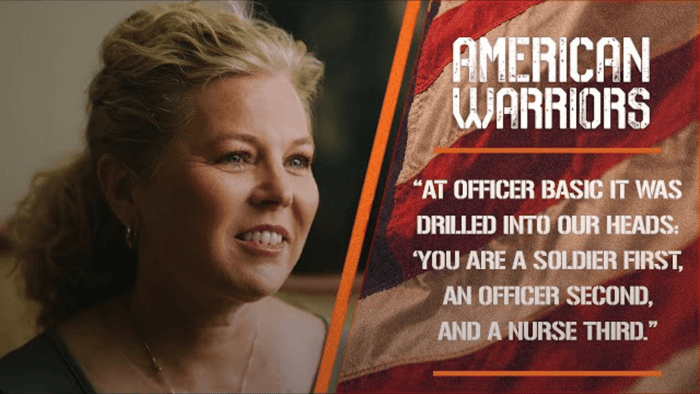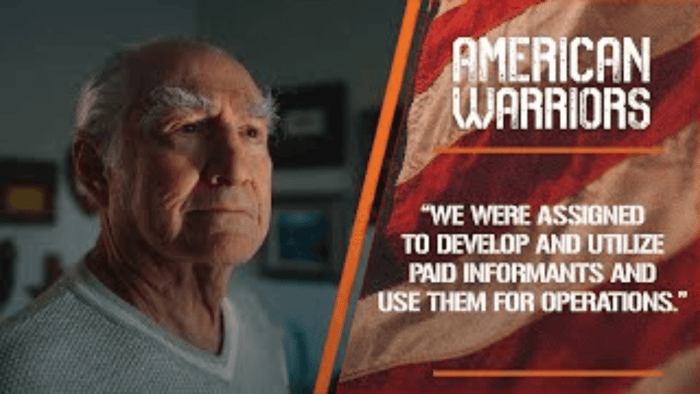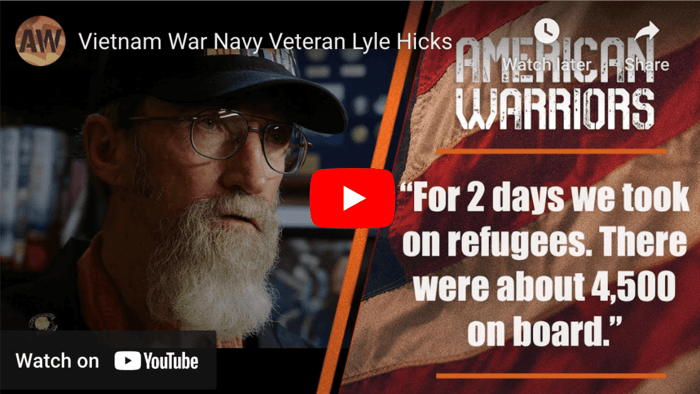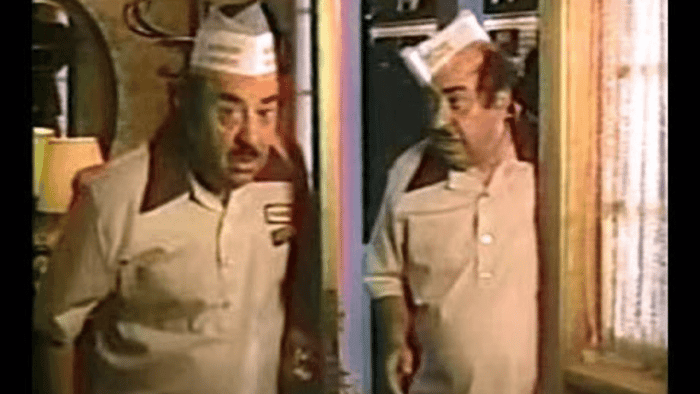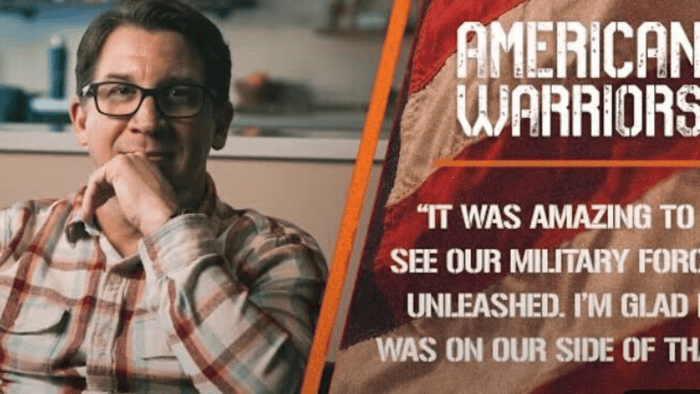An American Warriors Production - Lisa Herterich | US Army Nurse
Introduction
This will explore the experiences of Lisa Herterich, a US Army nurse who served in the military for several years. Lisa Herterich will share her journey, including how she first joined the military and what it was like to serve as a nurse. Students will also reflect on Lisa Herterich's lessons learned and discuss the importance of giving back to the military community.
Lesson Plan
This document is a lesson plan about the experiences of Lisa Herterich, a US Army nurse who served in the military. The lesson plan includes objectives, group discussion questions, a feature video, and transcripts of Lisa's experiences. In addition, there is a callout block verifying the information in the document and a list of editors and tags.
Objectives
- Understand the experiences of a US Army nurse
- Reflect on the lessons learned from Lisa Herterich's military service
- Discuss the importance of service and giving back to the military community
Group Discussion Questions
- What inspired Lisa Herterich to join the military?
- What was Lisa's experience like as a nurse in the army?
- How did Lisa's military service shape who she became?
- What challenges did Lisa face when transitioning to civilian life?
- What is Lisa's current passion and calling in life?
Feature Video
See other American Warriors Films
Transcripts
(00:00)
I was crouched with my poncho on under a tree. I forget what we were doing. We hadn't eaten all day long. I opened an MRE. It was cold, starving, and I ate it. And I was wet, cold, hungry, eating an MRE, and thought, this is the army.
(00:43)
My dad guilted me into joining the army. Believe it or not, my story begins with, I was in nursing school at Texas women's university, and I was home on the weekend, and the army, as they were always doing, sent up a little postcard through the mail, apply for an army ROTC nursing scholarship.
(01:05)
And I saw it, and I thought, I don't have any intention of joining the army. So I threw it into the trash, and my dad found it and pulled it out of the trash and said, you could really help this family if you would apply for this scholarship.
(01:19)
And I'm like, okay, I'll apply. And I opened the door, walked in, and there was a major sitting there, and I think it was a staff sergeant, I'm not sure. And they both didn't even get up out of their chairs.
(01:34)
Just kind of looked at me and said, can we help you? And I said, I wanted to apply for the scholarship, and they asked me my GPA. And when I told them my GPA, they immediately just jumped up and wanted me to apply.
(01:47)
And then I got the scholarship. And then what do you do when you are offered a full ride scholarship? Take it. And so I found myself in a position that I didn't expect, because the military was never on my radar.
(02:01)
It was something the men in my family did. I didn't ever picture myself as a soldier or doing any of those things. And the great thing is, it was one of the best decisions of my life, because it really shaped who I became.
(02:19)
It helped me realize the potential within myself and that I could do these things, that I was stronger than I thought. And it really, really paved the way for who I am and where I am today. My MoS. Was chosen for me because I had an army nursing scholarship, and so was a 66 hotel, which is a medical surgical nurse.
(02:46)
I remember that moment when I thought, okay, I'm in the army. And then the moment that I realized, okay, I'm a nurse in the army, it was always drilled into our heads, you are a soldier first, you are an officer second, and you are a nurse third.
(03:01)
Okay? That's the hierarchy of what you are in the military. So at officer basic, we did all the field exercises, land navigation, all that stuff. But when I really realized I was a nurse in the army, it was our last day, and we had an obstacle course that we had to do.
(03:19)
And it was it was the full deal. It was all the the sound effects. The smoke, everything else, as if you're on a battlefield. There was a part where we had to carry litters with patients on them, and they were heavy and run with the litters to the, to the aid stations.
(03:37)
And this kind of was the point. Where I realized, you're a nurse in. The army, and this is real, this is real. And then it really hit with me. There was a station where we had to do triage, and so it was full, what we call moolage.
(03:53)
So they had basically actors there that had full makeup depicting battlefield injuries. And they gave me tags, and I had to walk through and triage everybody that was there. It's a four tier system. You've got level one is you're walking.
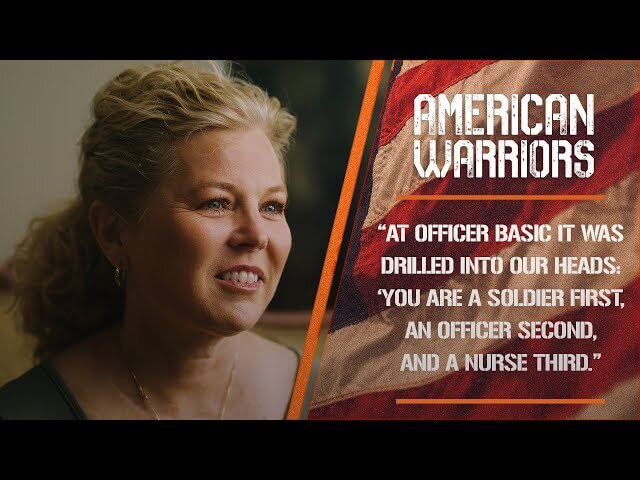
(04:11)
Wounded minimal, then you're delayed. They need care, but they can wait for a little bit. They can wait a few hours or whatever. And then three was, if you don't. Do something with these soldiers immediately, they're going to die.
(04:24)
They need immediate treatment, they're unstable, they can't breathe, something like that. And then the last group is expectant. And that's the one that hit me the hardest, because I was coming from. Civilian nursing or that's where I had.
(04:36)
Trained, where you do everything you can in these situations to save everybody. And it hit me that in a battlefield situation, there may be people who are alive, and in a civilian situation. You would have an opportunity to save.
(04:50)
But you can't in that situation. So you put them to the side, and hopefully you can assign someone to be with them and provide comfort, care until they die. And that really hit me hard, and I thought, this is how it is.
(05:09)
So I learned a lot. And it was in that situation, I thought, this is the army, and this is what I am training to do. While I was in ROTC, probably my last year in in college, I was doing my clinicals in Dallas and I met my future husband there and it was a bit of a whirlwind romance.
(05:34)
So my last year of ROTC and of college, I got engaged. Graduated from college in May. Took my state nur nursing boards in July, got married in August. Reported down to Fort Sam Houston for Officer Basic.
(05:51)
The beginning of September. And then a month after that, took a cross country drive in a 66 Mustang to Fort Ord, California. Home with a 7th Flight Infantry Division for my first duty station. So it was a huge post.
(06:04)
There were over 10,000 people. I remember it was a closed post because there was a division there. And I do remember we drove up and my husband was driving. And if it's a closed post, you have to have a sticker to get onto post.
(06:20)
So there were different stickers for officers and for enlisted. And I had an officer sticker on my car and they salute if it's an officer sticker and you're supposed to return the salute while my husband was driving.
(06:34)
And so the soldier that was there saluted and I saluted back and I remember his eyes looking from my husband back to me back and forth because he wasn't expecting me to return this salute. I worked in at Silas B.
(06:49)
Hayes Army Community Hospital. So I went to the Family Practice Clinic as the assistant head nurse and basically the Family Practice Clinic. Ah, the Fort Ord had a huge family practice residency program for doctors and we had about 23 physicians in the clinic.
(07:06)
And I was basically in charge of all the support personnel for the doctors in the clinic. Many people's perception of the army and and the military in general, of course. You know, when you think of the army, you think about combat troops, you think about the soldiers, you think about the artillery, you think of all the pieces that go together to accomplish the mission on ground.
(07:30)
But for that mission to be accomplished, there are a lot of other pieces that have to be in place. And actually, that support piece is a lot bigger than the actual mission piece itself. Another great thing about working with the medical in the army is that we were on an even playing field.
(07:50)
So in the civilian world, especially at the time when I went through nursing school, there was definitely a hierarchy. Had your nurses and your doctors and even some of the older nurses. I remember when I was in nursing school would get up and give the doctors their chair when the doctors would walk on the unit type of thing, even though they needed to get their charting done or whatever.
(08:10)
But it was an even playing field. In the army, I was respected for what I did, what I brought to the table, what I contributed as a nurse and to the care of patients. They asked my opinion about things.
(08:21)
I could make suggestions. We were all in it together. And that's one of the things about being in the military, is you're all in it together. And that was also very true on the medical side. When I started at the family practice clinic, I actually was teaching the OB classes.
(08:42)
So I remember it was really important to me when we were choosing who to bring in to the clinic for their OB care. I always tried to choose the the junior enlisted wives because they were typically younger, less educated, and didn't have family.
(09:00)
And so I felt like they needed the support. The support was really, really important, and. That was one of my goals, was. To be able to take care of that population there and then. I became an OB patient myself.
(09:17)
Um, while I was there, I worked pretty much up until the day that I went into labor. And at the time, I remember I was really kind of upset because the army would only give you five weeks off if you had a baby, but the Navy gave you six weeks.
(09:37)
That just didn't seem quite fair to me, so you were expected to get back to work pretty quickly. During the four years I was at Fort Ord, the transformation was pretty amazing. I developed into a leader that I didn't know I could be.
(09:54)
I had two children, and so I became a mother, which was another completely new role for me. But from the time I got there to the time I left, I was a completely different person than when I arrived. Right as I was leaving Fort Ord.
(10:09)
It was on my I was supposed to be assigned to a field hospital at that time, but that didn't happen because I went to Fort Leavenworth instead. I was three. I was a captain. And I remember walking into the Munson Army Community Hospital and meeting the chief nurse, who promptly told me that I would be working in the emergency department.
(10:32)
And I almost died when she told me that, because I had worked on a medical floor, I had worked in clinics, done a lot of things there, but the emergency department scared me. But again, I see it now as a pivotal point in my life because I was a captain and I had experience.
(10:55)
I was put the emergency department, and I thrived. And I was so frightened to begin with, but I learned again, lessons about myself that I liked not knowing what was coming through those doors. I liked the challenge of having to be on my toes.
(11:15)
Of having to use all my assessment skills, all my senses, to try to figure out what was going on, to help the person, you know, whatever, what was happening in that moment, and that I thrived in that environment.
(11:29)
And it was a complete and total shock to me. It was something I never in a million years would have chosen for myself. Dawn over the Persian Gulf, and Marine artillery pointed north to Kuwait, ready to be moved to desert locations.
(11:44)
August of 1990, I can remember standing in my living room in in Leavenworth looking at the TV and seeing everything that was unfolding, which would become Operation Desert Shield. And I looked at my husband and I just said, oh, no, this is real now we're deploying troops.
(12:05)
And I went into the hospital the next day, and the rumor going around was that they were going to take all the nurses from the hospital rank of captain and above, which was me, as one of them, and we were going to be deployed.
(12:20)
And I was promptly given a packing list. That was another one of those moments. My children were young, they were babies. The youngest was a baby, and my husband was in school, and I was thinking, this was real, getting all the stuff in my ruck and packed and ready to go, and it was real.
(12:43)
And I was so torn because I was thinking, I got babies. I don't want to leave these babies here. My husband's in school. He's going to have to quit school to take care of the kids, and I don't want to leave my kids right now.
(12:58)
But the other part of me was, this is what I have trained for. This is my mission, this is what I need to do. And that sense of duty, of wanting to be a part of that, to help the soldiers that were over there and to be a part of that mission was strong as well.
(13:16)
And the irony is what they ended up doing is taking all the doctors from our hospital and leaving the nurses so all that hurry up and wait, which is typical of the military. I didn't have to face that situation, so I was.
(13:35)
At Leavenworth until 90, 92, when I got out of the army. When I was leaving the Army, I remember I was sitting in my chief nurse's office because I was out processing and it was my last time to see her.
(13:45)
And I remember sitting there and I was embarrassed because I started to cry. And I told her, I said, I don't know how to be anything else. And my identity was so enmeshed in the middle military lifestyle and in being in the army that it really was frightening to me.
(14:07)
I was proud of who I was becoming, of who I had become. I was proud of being a soldier. I was proud of being an officer. I was proud of being a nurse. I made the decision to get out because it was what was best for my family.
(14:22)
So I had to look at that bigger picture. And again, it's that mother component, what's best for my children, what's best for my husband, what's best for us. And it still gets me to this day. I just remember sitting there and saying to her, I don't know how to be anything else, and what am I going to do?
(14:40)
Everybody's experience in the army, in the military is different, and some people don't have good experiences. I had a great experience and it was life altering to me, and it really made me who I am.
(14:54)
And to think that it all started when I didn't really want to do it. I was doing it to please somebody else. And at the end of the day, it made me into a strong, competent, compassionate woman. When I left the military theory, I felt that I needed to make a clean break, and so I did.
(15:21)
And for many years, I didn't. I didn't really even think about my military service. I had to adjust a civilian life. I had to make my way in the civilian world. At the time I got a master's degree in nursing education, I started teaching at the local university, and I started getting a lot of students that were vets.
(15:42)
And it just opened my eyes to a lot of the trauma and the struggle that was going on with a lot of the soldiers that were coming home from our conflict in Iraq and then Afghanistan. And I happened to find a course that addressed spiritual injury and combat veterans.
(16:07)
And I facilitated this course called Reboot for several years. And it was through this working with this course, and it led me to start my work with veterans, which is really my passion and my calling now.
(16:22)
I became a microcurrent neurofeedback practitioner to be able to help people to regain their lives, to overcome the debilitating effects of trauma. And we really underestimate the effect trauma can have on the body and on the brain and nervous system.
(16:38)
It's kind of the capstone of my career and my life in being able to help those. So I'm continuing in service. I see in the big picture how God's hand and everything throughout my career, everything's kind of come full circle now.
(17:02)
I think about where I started in the army and where I am now working very frequently with veterans. And it has been actually one of the greatest honors of my life. I was. Proud to serve in the army. And now I'm I'm still able to give back and connect with the military community.
(17:21)
I may not get up and put a uniform on every day anymore, but I'm still able to connect with my brothers and sisters in arms and to help them to regain a sense of hope, a sense of purpose, to connect with a sense of normalcy in their lives.
(17:41)
And I can see how this is where God was leading me all along. And this is where I am supposed to be. Subscribe our channel.
